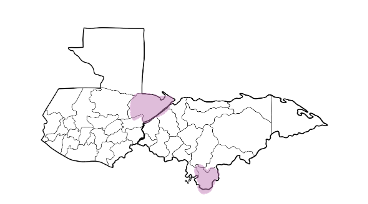Communities in Guatemala and Honduras are ready and empowered to respond to disasters
Strengthening disaster response capacity from the ground up
Rural, Indigenous, and Garifuna communities in Izabal (Guatemala) and Choluteca (Honduras) face multiple threats: floods, prolonged droughts, and wildfires—intensified by the growing impacts of climate change. Many of these communities live in poverty and have limited access to basic services.
In response, a binational initiative is working to turn community organization, prevention, and local leadership into powerful drivers of resilience.
What are we doing?
Over a two-year period, this project supports 30 communities in Guatemala and Honduras to:
- Anticipate and reduce disaster risks
- Strengthen local and institutional preparedness
- Promote women’s and youth leadership
- Foster a culture of prevention, equity, and sustainability
How do we make it happen?
- Community organization and local capacity-building
- Creation of emergency response committees (COLREDs and CODELs)
- Training in risk management, first aid, and early warning systems
- Provision of basic emergency response equipment
- Participatory planning with a gender lens
- Development of risk maps and preparedness plans
- Community drills and simulations
- Meaningful participation of women in every step, using CARE’s Women Lead in Emergencies methodology
- Resilient infrastructure
- Rehabilitation of water and sanitation systems
- Installation of rainwater harvesting and storage systems
- Community grain reserves to ensure food security during crises
- Institutional strengthening and coordination
- Training of public officials in rights-based and inclusive disaster risk management
- Update of local preparedness and response protocols and tools
- Risk communication for prevention
- Digital communication training for women, youth, and teachers
- Local and cross-border awareness campaigns on preparedness and anticipatory action
- Municipal fairs and community-based awareness events
52, 228
participants
30
communities with improved preparedness systems
8,520
people covered by early warning systems
Leadership that makes a difference
This project acknowledges that disasters do not impact everyone equally. Women—especially in rural and Indigenous contexts—face distinct risks, but also play a central role in protecting their communities.
That’s why women in all their diversity—Indigenous, Garifuna, older adults, youth—are at the forefront of community preparedness. Through CARE’s Women Lead in Emergencies approach, they are actively involved in planning, decision-making, and communicating life-saving messages. Their leadership is not just recognized—it is essential.
Geographic coverage
Guatemala: Department of Izabal, municipality of Livingston — 15 rural and urban communities
Honduras: Department of Choluteca, municipalities of Apacilagua, Choluteca, Marcovia, Morolica, and Orocuina — 15 rural communities



